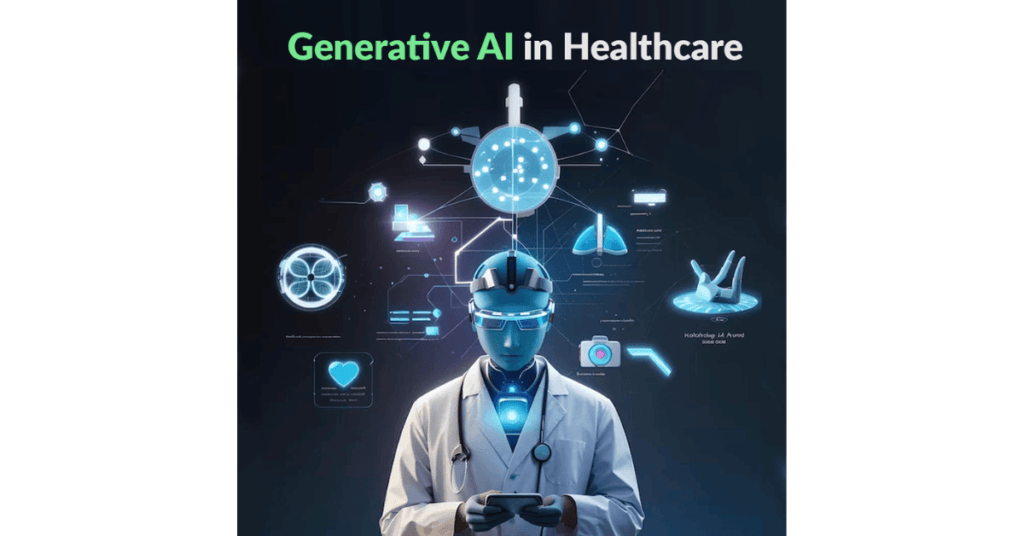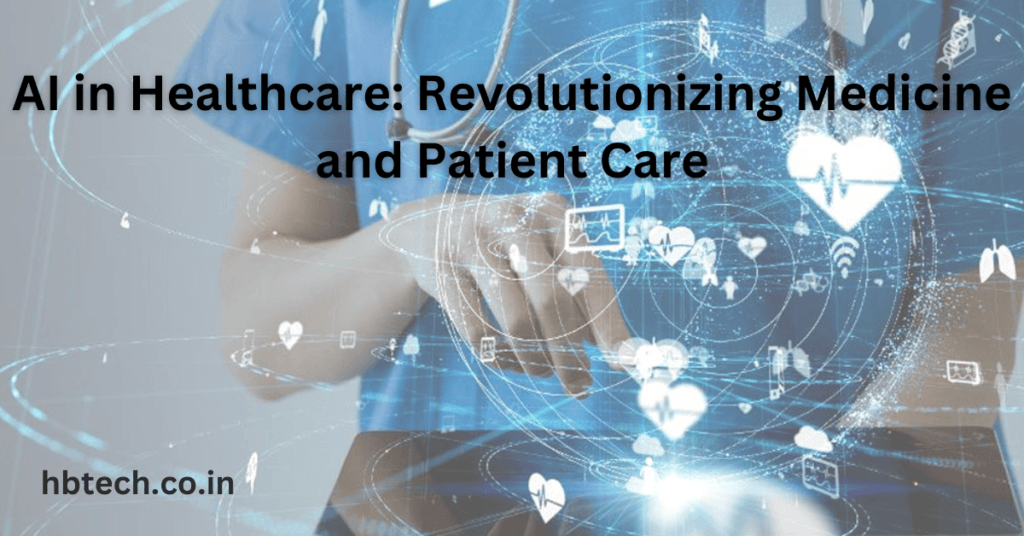
Artificial intelligence (AI) is making big changes in healthcare, offering new ways to diagnose, treat , and manage diseases more effectively. Through AI, healthcare providers are starting to improve patient outcomes , cut down on time-consuming tasks, and bring more personalized care to patients. In this article, we’ll break down how AI is reshaping healthcare, look at some challenges it faces , and explore what the future could hold.
Faster, More Accurate Diagnostics
One of the biggest impacts of AI in healthcare is in diagnostics. Diagnosing illnesses quickly and accurately is essential to successful treatment, especially in conditions like cancer, where early detection can make a life-or-death difference. Using AI, medical imaging tools can analyze X rays, MRIs , and CT scans with impressive accuracy, often helping doctors spot problems that might go unnoticed.
For instance, AI can be trained to detect signs of diseases like pneumonia or fractures in medical scans. These tools don’t replace radiologists, but they support them by highlighting areas that need extra attention, helping to reduce human error and speed up the diagnosis process. With AI handling repetitive aspects of diagnostics, healthcare providers can prioritize patient care and quick treatment decisions.
Personalized Treatments
AI enables healthcare providers to deliver more personalized care by taking a patient ’s unique medical history, genetics, and lifestyle into account. This is especially useful in fields like pharmacogenomics, where AI helps predict how well a patient might respond to certain medications based on their genetic profile. Personalized medicine means that treatments can be tailored more specifically to each individual, making them more effective and reducing potential side effects.
For instance, AI can help determine if a specific cancer treatment might work better for certain patients, based on data about the disease and how others with similar genetic backgrounds responded. This approach not only improves treatment effectiveness but also spares patients from unnecessary side effects.
Streamlining Administrative Tasks
In addition to enhancing treatment, AI can make healthcare more efficient by reducing the burden of administrative tasks, such as managing appointments and handling billing. Natural language processing (NLP) technology, a type of AI, can transcribe doctor-patient conversations automatically, freeing up doctors from lengthy paperwork. AI can also help hospitals organize patient flow, ensuring that resources are used effectively, and patients receive care more promptly.
By automating these everyday tasks, AI allows healthcare workers to focus more on patient care, reducing administrative costs and increasing the overall efficiency of healthcare facilities.
Virtual Health Assistants
Virtual health assistants are AI-powered tools that support both patients and healthcare providers by offering guidance on medication , answering common health questions, and even managing patient reminders for appointments. These assistants can help people manage their health from home, making healthcare more accessible, especially for those with chronic conditions.
For example, patients with heart disease or diabetes can use wearable devices that monitor vital signs in real time. These devices send data to AI systems, which can analyze it for any unusual changes, notifying both the patient and their healthcare provider if something needs attention. Virtual assistants also help reduce the load on medical staff by managing simpler inquiries, allowing doctors to concentrate on complex cases.
AI in Drug Discovery
Developing new drugs is a lengthy and costly process, often taking years of research and billions of dollars. AI is changing this by quickly analyzing large datasets to identify potential drug candidates and predict their effectiveness . Machine learning models can even simulate how a drug might interact with the human body, which cuts down on the need for some laboratory tests and speeds up development.
For example, during the COVID-19 pandemic, AI played a crucial role in understanding the virus, which helped speed up vaccine development. AI tools analyzed the virus’s genetic structure, which allowed researchers to develop effective treatments and vaccines in record time. As AI continues to advance, it could help researchers discover new drugs faster and make innovative treatments more affordable and accessible.
Challenges and Ethical Considerations
While AI brings many benefits, it also raises important challenges. One of the biggest concerns is data privacy. AI systems require access to large amounts of personal health data to be effective , so healthcare providers must ensure this data is secure. Patient trust is essential, and if privacy is breached, people may be less willing to share their medical information.
Another challenge is preventing bias in AI systems, which can occur if the training data doesn’t represent all patient groups. This could lead to unequal healthcare outcomes. For example, if an AI system is trained mostly on data from one demographic, it might not work as well for others. To make sure AI benefits everyone equally , healthcare providers and developers need to work together to build fair, transparent, and inclusive AI systems.
Future of AI in Healthcare
AI in healthcare is still growing , and its potential seems almost limitless. From predictive tools that help prevent diseases to AI-driven surgeries that improve precision, AI could reshape healthcare as we know it. For patients in remote or underserved areas, AI could bridge healthcare gaps by bringing advanced diagnostic tools and virtual consultations where resources are limited.
AI can also help healthcare shift to a preventive care model, where diseases are caught and managed before they worsen. By empowering both patients and healthcare providers, AI has the potential to make healthcare more effective, affordable, and accessible.
AI is creating exciting new possibilities in healthcare by improving diagnostics, enabling personalized treatment, streamlining administrative processes, and supporting drug discovery. Although challenges remain, such as protecting patient privacy and ensuring AI systems are free from bias, the potential benefits are transformative. As technology continues to advance , AI will likely play an even more central role in delivering efficient, high-quality healthcare, making a positive impact on patients around the world.
Frequently Asked Questions(FAQs)
How is AI used in medical diagnostics?
AI is widely used in diagnostics to analyze medical images like X-rays, MRIs, and CT scans. It can quickly identify abnormalities, supporting doctors in diagnosing conditions such as cancer, fractures, and respiratory issues. This helps speed up the diagnostic process and reduces human error, leading to more accurate and timely treatment.
What is personalized medicine, and how does AI help with it?
Personalized medicine tailors treatments to an individual’s unique medical profile, considering factors like genetics, lifestyle, and medical history. AI helps by analyzing this data to predict which treatments will be most effective for each patient, reducing side effects and improving outcomes.
Can AI reduce administrative work for healthcare providers?
Yes, AI can automate many routine administrative tasks, such as transcribing doctor-patient conversations, scheduling appointments, and managing billing. This allows healthcare staff to spend more time focusing on patient care, ultimately improving efficiency and reducing costs.
What are virtual health assistants, and how do they benefit patients?
Virtual health assistants are AI-powered tools that help patients manage their health by answering questions, reminding them of medication schedules, and even monitoring vital signs. They make healthcare more accessible and help patients manage chronic conditions from home, providing real-time updates to healthcare providers if necessary.
How does AI support drug discovery?
AI speeds up the drug discovery process by analyzing massive datasets to identify potential drug candidates and predict their effectiveness. It can simulate drug interactions in the body, which reduces the need for some lab tests. This shortens development time, making it quicker and more cost-effective to bring new drugs to market.
What are the main challenges of using AI in healthcare?
The primary challenges include ensuring data privacy, as AI systems require large amounts of personal health data. Another challenge is preventing bias in AI algorithms, which can lead to unequal healthcare outcomes if not addressed. These concerns must be managed carefully to build trust and ensure AI benefits all patient groups.
What is the future of AI in healthcare?
AI is expected to play a central role in healthcare, from early disease detection to advanced robotic surgeries and even remote consultations. As AI continues to advance, it could make healthcare more efficient, accessible, and affordable, bridging gaps in underserved areas and supporting a more preventive approach to medicine.









